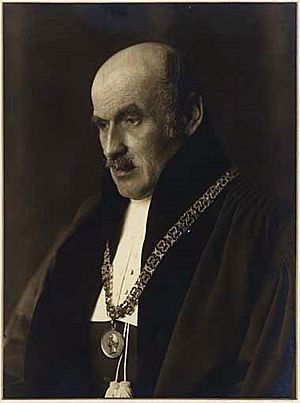Karl Vossler facts for kids
Quick facts for kids
Karl Vossler
|
|
|---|---|

Karl Vossler (1926)
|
|
| Born | 6 September 1872 Hohenheim, Württemberg, Germany
|
| Died | 19 September 1949 (aged 77) |
| Occupation | Romanist |
Karl Vossler (born September 6, 1872, in Hohenheim, Germany – died September 19, 1949, in Munich) was an important German scholar. He was a leading expert in Romance studies. This field focuses on languages and cultures that developed from Latin, like Italian, French, and Spanish. Vossler was very interested in Italian ideas and thinkers, especially Benedetto Croce.
Early Life and Education
Karl Vossler was born in Hohenheim, a town in Germany. He grew up with a strong interest in languages and literature. In 1897, he earned his doctorate degree from the University of Heidelberg. This was a big step in his academic journey.
Academic Career
Vossler became a professor in 1909. He taught Romance studies at the University of Würzburg. Two years later, in 1911, he moved to the University of Munich. He continued teaching there for many years. He helped many students learn about languages and cultures.
Views and Beliefs
In 1914, Karl Vossler signed a document called the Manifesto of the Ninety-Three. This document showed support for the German military at the start of World War I. However, he later strongly disagreed with the Nazi government. He even helped many Jewish thinkers during that difficult time. This showed his courage and strong moral compass.
Key Works
Karl Vossler wrote many important books. Some of his works were translated into English. They helped people around the world learn about his ideas.
- His book "Mediaeval culture" was translated in 1929. It was an introduction to the famous writer Dante and his time.
- "The spirit of language in civilization" was translated in 1932. This book explored how language connects to human culture.
- He also wrote about the French playwright Jean Racine. This book was translated in 1972.
See also
 In Spanish: Karl Vossler para niños
In Spanish: Karl Vossler para niños
- Karl-Vossler-Preis
 | Laphonza Butler |
 | Daisy Bates |
 | Elizabeth Piper Ensley |

